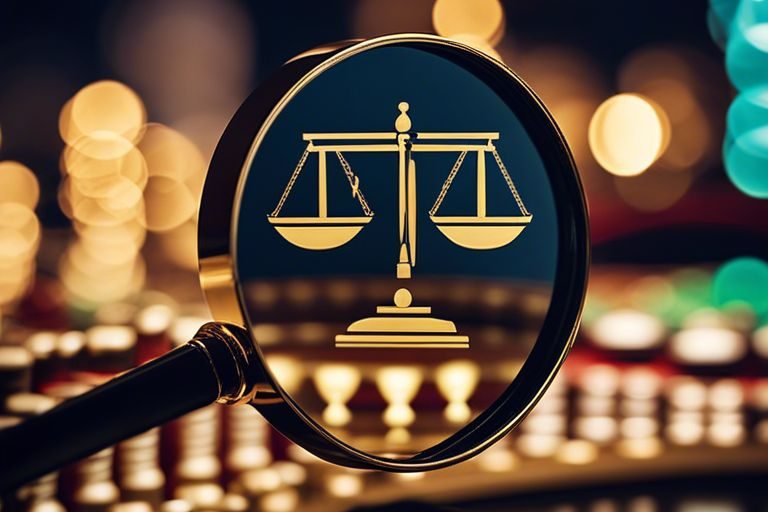Understanding Online Casino Regulation Basics

Regulation of online casinos is crucial to ensuring a safe and fair gaming environment for players. It helps in protecting against fraudulent activities, ensuring responsible gaming practices, and maintaining the integrity of the industry. Understanding the basics of online casino regulation is essential for both players and operators to navigate the legal framework and make informed decisions. This post will provide you with a comprehensive overview of the key aspects of online casino regulation, including licensing, jurisdiction, and the role of regulatory bodies.
The Purpose and Goals of Online Casino Regulation
To ensure a safe and fair online gambling environment, online casino regulation serves several important purposes and goals. These regulations are put in place to protect players, prevent fraud and money laundering, and generate revenue for governments.
Protecting Players and Ensuring Fair Play
An essential purpose of online casino regulation is to safeguard the interests of players and promote fair play within the industry. Regulations help establish standards for game fairness, player protections, responsible gaming measures, and the handling of customer funds. By enforcing these standards, regulatory bodies aim to protect players from unscrupulous operators and ensure a level playing field for all participants.
Furthermore, strict oversight and compliance requirements are implemented to hold operators accountable for their actions and maintain the integrity of the gaming experience. The goal is to instill trust and confidence in players, knowing that they are engaging in a transparent and secure online gambling environment.
Preventing Fraud and Money Laundering
Online casino regulation also plays a crucial role in preventing fraudulent activities and money laundering within the gambling industry. By imposing stringent licensing conditions and regulatory standards, authorities aim to deter criminal elements from exploiting online casinos for illicit purposes. Enhanced due diligence procedures and transaction monitoring help identify and mitigate potential risks, safeguarding the integrity of financial transactions and protecting the industry from being used as a channel for illegal activities.
Preventing fraud and money laundering is a top priority for regulatory bodies, as it not only protects the reputation of the online gambling sector but also contributes to wider efforts in combating financial crimes and ensuring compliance with international regulatory standards.
Moreover, by imposing taxes, licensing fees, and other financial obligations on the operators, online casino regulation generates significant revenue for governments. This revenue contributes to public funds, social initiatives, and the regulation of the gambling industry itself. Additionally, by channeling funds from the gambling sector into government coffers, regulated online casinos also support various public services and projects, enhancing the overall welfare of the society.
Key Regulatory Bodies and Jurisdictions
Any individual or entity considering entering the online casino industry needs to have a solid understanding of the key regulatory bodies and jurisdictions governing this sector. This knowledge is crucial for ensuring compliance with the relevant laws and standards, as well as maintaining a reputable and legally sound operation.
Overview of Leading Regulatory Authorities
OverviewBeing aware of the leading regulatory authorities in the online casino industry is essential for operators and stakeholders. The Malta Gaming Authority (MGA), United Kingdom Gambling Commission (UKGC), and the Gibraltar Regulatory Authority are among the most influential bodies in this space. These entities are known for their stringent regulations and high standards, which aim to protect players from unfair practices and ensure the integrity of the industry. Compliance with the requirements set forth by these regulatory authorities is often a prerequisite for obtaining a legitimate gambling license and operating within the boundaries of the law.
The proactive approach of these regulatory bodies in addressing emerging issues and technological advancements in the online gambling sector has contributed to a more secure and transparent environment for both operators and players. The comprehensive frameworks and ongoing oversight provided by these authorities have played a crucial role in shaping the standards and practices of the global online casino industry.
Jurisdictional Differences in Online Gambling Regulation
With the expansion of the online gambling market, it’s important to be aware of the jurisdictional differences in regulatory approaches. Each jurisdiction may have its own unique set of laws, requirements, and enforcement mechanisms that impact how online casinos operate within their boundaries. Factors such as tax rates, licensing fees, and the legal status of certain gambling activities can vary significantly from one jurisdiction to another, which can have far-reaching implications for businesses and players alike.
Compliance and Licensing for Online Casinos
Keep in mind that compliance and licensing are essential aspects of running an online casino. This process ensures that online casinos operate within the legal framework and provide a safe and fair gaming environment for their players.
The Licensing Process for Online Casinos
Process of obtaining a license for an online casino involves thorough scrutiny by regulatory bodies. Online casinos must demonstrate their financial stability, integrity, and ability to provide a secure platform for players. Additionally, they must comply with strict anti-money laundering and player protection regulations.
Ongoing Compliance and Auditing Requirements
Casinos must adhere to ongoing compliance and auditing requirements to maintain their licenses. This includes regular financial and operational audits to ensure transparency, fairness, and security for players. Furthermore, they must continuously update their systems to meet evolving regulatory standards and undergo regular inspections to verify their compliance.
Plus, online casinos must have adequate measures in place to protect players from problem gambling and ensure responsible gaming practices. This involves providing resources for player self-exclusion and setting deposit limits, as well as educating players about the potential risks of gambling.
The Future of Online Casino Regulation
Not only is the regulation of online casinos evolving, but the future of online casino regulation is also shaping up to be quite dynamic. As technology advances and new trends emerge, the regulatory landscape for online casinos is expected to undergo significant changes.
Emerging Trends and Technological Advancements
One of the most prominent emerging trends in online casino regulation is the implementation of stricter measures for player protection and responsible gambling. With the rise of technology, regulators are exploring the use of advanced tools such as artificial intelligence and machine learning to monitor and detect potential addictive behavior or problem gambling. This is a positive step towards creating a safer and more responsible gambling environment. Additionally, the integration of blockchain technology for transparent and secure transactions is gaining traction, potentially revolutionizing payment methods and enhancing the integrity of online casino operations.
Challenges and Opportunities Ahead
Any discussion of the future of online casino regulation must also address the challenges and opportunities that lie ahead. One of the major challenges is keeping pace with the rapid advancements in technology and adapting regulations to encompass novel forms of online gambling, such as virtual (5 posts)" class="autobesttag" style="color:#77da55" rel="nofollow" href="https://malta-media.com/tag/virtual/">virtual reality casinos and cryptocurrency-based gaming. At the same time, there is an opportunity for regulators to collaborate on a global scale to standardize best practices and create a more cohesive regulatory framework for the online gambling industry.
Emerging from these challenges are opportunities for regulators to proactively engage with industry stakeholders, leverage technology for more efficient monitoring and enforcement, and foster innovation in responsible gambling initiatives and consumer protection measures.
Conclusion
Following this comprehensive overview of online casino regulation basics, it is clear that understanding the laws and regulations governing online casinos is crucial for both players and operators. While the regulatory landscape may vary from country to country, it is essential to be aware of the basic principles that underpin online casino regulation, such as licensing requirements, player protections, and responsible gambling measures. By adhering to these regulations, online casinos can ensure a safe and fair gaming environment, while players can enjoy peace of mind and confidence in the integrity of the platforms they are using. As the online casino industry continues to evolve, staying informed and compliant with regulatory standards will be paramount to ensuring the ongoing success and sustainability of the sector.
Frequently Asked Questions (FAQs):
What is the primary purpose of online casino regulation?
Answer: Online casino regulation serves to ensure a safe and fair gaming environment, protect players, prevent fraud, and generate revenue for governments.
How do regulatory bodies prevent fraud and money laundering in online casinos?
Answer: Regulatory bodies deter illicit activities by imposing stringent licensing conditions, enhanced due diligence, and transaction monitoring.
What are some leading regulatory authorities in the online casino industry?
Answer: Influential regulatory bodies include the Malta Gaming Authority (MGA), United Kingdom Gambling Commission (UKGC), and the Gibraltar Regulatory Authority.
Why is compliance and licensing crucial for online casinos?
Answer: Compliance and licensing ensure online casinos operate within the legal framework, providing a safe and fair gaming environment for players.
What emerging trends are shaping the future of online casino regulation?
Answer: The future involves stricter measures for player protection, the use of advanced technologies like AI and blockchain, and addressing challenges in virtual reality and cryptocurrency-based gaming.
Recommended Posts

Mobile Payments in iGaming
July 26, 2024

EveryMatrix & beBettor Ensure Safer UK Gambling
July 26, 2024

Oddsgate Secures GLI-33 Certification
July 26, 2024



